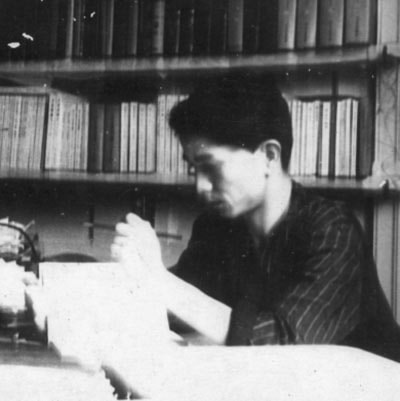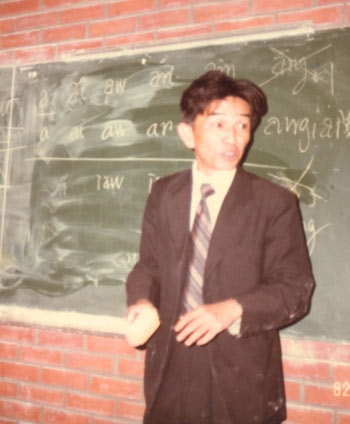Linguist, Professor, People's Teacher Nguyen Tai Can passed away
After many months of illness, with the devoted care and treatment of his family and doctors, Professor - People's Teacher (GS-NGND) Nguyen Tai Can passed away at his home in Moscow at 7:10 p.m. (Hanoi time) on February 25, 2011 (January 23, Tan Mao year), at the age of 87. On February 28, 2011, the Professor's funeral was solemnly held in Moscow.
(Baonghean) -After many months of illness, with the devoted care and treatment of his family and doctors, Professor - People's Teacher (GS-NGND) Nguyen Tai Can passed away at his home in Moscow at 7:10 p.m. (Hanoi time) on February 25, 2011 (January 23, Tan Mao year), at the age of 87. On February 28, 2011, the Professor's funeral was solemnly held in Moscow.
At the private home of Ms. Nam Hoa (Professor's daughter) in Hanoi, the children and grandchildren set up an altar to pay their respects.
As students of Literature K22 (1977-1981) at Hanoi University of Science, it was not until the beginning of the 5th semester of the 9 regular semesters that our class was taught a specialized subject by Mr. Nguyen Tai Can. Before that, we had only "respected and kept a distance" from this teacher who was so dignified that "Confucianism permeated our bones and marrow" (a term used by Professor Phan Ngoc). That afternoon, Dr. of Linguistics Dinh Van Duc, Head of the Literature K22 class, announced: "Mr. Can has just returned from Paris University, next Monday morning he will give his first specialized subject". Mr. Duc also "revealed" to us how to make the most of the precious time Mr. Can would devote to the class.

Linguist Nguyen Tai Can works at
Leningrad State University (former Soviet Union). English:Internet
After a few minutes of self-introduction, "I would like to ask for your permission to smoke during the presentation." Still with a heavy but concise Nghe An accent, the teacher began in general: The ancients taught "learn to eat, learn to speak, learn to wrap, learn to open", placing "learn to eat" first, "learn to speak" later is in accordance with both natural and social laws. A newborn baby knows how to suckle (a way of eating), then it learns to speak; in which learning to speak belongs to the field of Linguistics. Our people have just escaped from war, to have a grain of salt or a drop of oil, they have to queue all day, but they do not take learning to speak lightly because of poverty or hardship. Signing the application to study Linguistics, 31 students of the class volunteered to be shock troops in preserving and developing the language and writing of the nation.
From the lecture hall, I saw hundreds of students from different fields of study such as Literature, Han Nom, History, Philosophy, Law, and even students from the neighboring Foreign Language University crowded the hallway to listen to the profound knowledge of the "artist on the podium". Later, there was no longer a "respect but distance" between teachers and students. I learned that the teacher was born on May 2, 1926 in Thuong Tho village (now Thanh Van commune, Thanh Chuong district, Nghe An) in a Confucian family with a tradition of patriotism.
During his youth, he studied at Vinh National School and then transferred to Hue National School. After the August Revolution, he joined the resistance war in Nghe An, became a member of the Communist Party of Vietnam from 1949, and also started teaching at this time. In 1952, he was appointed as a university assistant of the first university class in Inter-zone IV. In 1953 - 1954, he was the Head of the Professional Department of Inter-zone IV Education Zone. From 1955 - 1960, the Vietnamese Ministry of Education appointed him as the first Vietnamese linguistics expert in the Soviet Union (working at Leningrad State University). In 1960, he successfully defended his first Vietnamese PhD thesis in the Soviet Union on Linguistics with the topic "Parts of speech of Vietnamese nouns".
From 1961 to 1971, he was the Head of the Linguistics Department at the Faculty of Literature, Hanoi University of Science. In 1980, he was awarded the title of professor by the State. In 1982, 1988, 1990, he was a visiting professor at the University of Paris 7 (France) and in 1991 at Cornell University (USA). In 2000, he was awarded the Ho Chi Minh Prize by the State for a cluster of 3 works: "Vietnamese Grammar - Compound Words, Short Phrases", "Textbook on the History of Vietnamese Phonetics" and "Origin and Process of Sino-Vietnamese Reading". Together with Professor Dao Duy Anh and Professor Hoang Xuan Han, up to this point, Professor Nguyen Tai Can is one of three Vietnamese linguistics researchers honored to receive the Ho Chi Minh Prize. In 2008, he was awarded the title of People's Teacher by the State.
His life is a shining example of a patriotic and revolutionary intellectual, a model of a tireless and diligent intellectual worker. His training career left many talents for the country in the field of Linguistics. His scientific works bring basic scientific knowledge to society and suggest many approaches for today's generations. As one of the leading experts in Linguistics in our country, he has trained many generations of students and postgraduates majoring in Linguistics, Vietnamese Linguistics, Han Nom, and trained many professional staff who have now grown up. He has made great contributions to the establishment of the Linguistics major at Hanoi University of Science (now the Faculty of Linguistics of the University of Social Sciences and Humanities, under the Vietnam National University, Hanoi).

Professor Nguyen Tai Can lectures at the University of Paris. Photo: Internet
He retired and lived in his wife's homeland, Russia. In the last years of his life, despite his old age and declining health, for many years he still traveled thousands of miles to visit his hometown, Nghe An. On these occasions, after completing the work of burning incense for his ancestors, he always took the initiative to stay in Vinh City to meet and have fun with friends and colleagues, reliving his humble days. In particular, he always took the initiative to meet with generations of former students who were Literature students of Hanoi University of Science who were working in his hometown to encourage and advise them to do their best to contribute to the development of Nghe An, "a land that the more you study the field of local studies, the more formidable it is" (his words). In the last ten years of his life, he regularly sent articles to be published in domestic scientific journals, especially in the Nghe An Culture Journal, and in the special journal of the University of Social Sciences and Humanities, now part of the Hanoi National University.
Regarding his personal life, he once had a wife named Nguyen Thi Kim Loan (from Hung Tien commune, Hung Nguyen district), but they later separated. His second wife was a Russian woman who was also a prestigious linguist, with many studies on the Vietnamese language. More than 30 years ago, studying at the Faculty of Literature at Hanoi University, our generation heard some beautiful anecdotes surrounding the international Vietnamese-Russian love affair between him and Ms. NVStankyevich.
In early January 2006, Thay returned to Hanoi from Russia. The next day, the "Nghe scholar" took the Hanoi-Vinh train alone to Thuong Tho village to fulfill his duty as a descendant of the Nguyen Tai family. On that visit to his hometown, Thay allowed me to accompany him to his private home to burn incense and pay respect to the late "School Inspector" Nguyen Tai Dai, whom Thay called his uncle, who had passed away more than a year before. When burning incense and visiting the grave of Mrs. Nguyen Thi Kim Loan, Thay cried for a long time at the grave of his ex-wife, making me deeply understand the saying "even though we are apart, my heart still has strings of love".
One beautiful morning, I accompanied my Teacher to Tien Dien (Ha Tinh) to offer incense at the grave of the great poet Nguyen Du. Although I had not yet read his latest discoveries about the Tale of Kieu, after a day of accompanying him, I deeply felt the words Filial Piety and Heart in the venerable Teacher.
Symphony






